EU Slowly Weening Off Russian Crude Gives Moscow Time To Divert Flows To Asia
The European Union is taking another step away from Russian oil, but they're not doing it quick enough to crush Russia's energy complex as new customers are found in Asia, Russian analysts told Reuters.
On Monday, EU leaders approved the sixth round of sanctions against Russia that reduces Russian oil imports by 90% by year-end but only covers crude and petroleum products by sea, excluding crude routed through pipelines.
EU's sanctions against Russia are not hard-hitting, which were initially meant by Brussels to penalize Moscow for its invasion of Ukraine. Though Western analysts and market watchers say, the latest round of sanctions won't imminently crush Russia's energy industry.
"Although, the measures announced by the European Union look threatening, we don't see a crippling impact on the Russian oil sector - neither imminent nor in six months. Russian oil producers have time to solve logistics problems and change their client base," Russia-based Sinara Investment Bank analysts said.
Those analysts pointed out that Asian buyers purchase more Russian crude than Europeans. They said flows to the EU declined to 2.25 million barrels per day (bpd) from March. At the end of 2021, the EU accounted for 60% of Russia's oil exports, totaling 3 million bpd, adding that supplies the EU isn't taking anymore are being diverted to China and India.
Moscow shrugged at the EU's new partial ban on Russian oil imports this week, while Mikhail Ulyanov, Russian Permanent Representative to international organizations in Vienna, tweeted:
"Russia will find other importers. Noteworthy that now she contradicts her own yesterday's statement. Very quick change of the mindset indicates that the # EU is not in a good shape."
The EU is heavily dependent on Russian energy imports, getting around 40% of its natural gas and 25% of oil from Russia. Its ability to 'cold turkey' Russian fossil fuels is near impossible or risk collapsing the bloc. Thus the phased reductions rather than an immediate embargo on Russian oil allow Moscow to reroute volumes to new customers.
Moscow-based BCS Global Markets said it would take at least two years for the EU to find alternative sources of oil that would replace the Russian supply.
"We expect large volumes of oil and oil products (from Russia) to continue flowing to Europe - either openly or via grey schemes - in a year or even two," BCS Global Markets said.
One source at a Russian oil company told Reuters: "We had time to prepare," referring to the EU's inevitability of reducing reliance on Russian oil.
Another trading source said volumes to Europe are being rerouted to hungry customers in Asia.
"There won't be big shocks for Russia," he said. "India takes it all for now. I'm not sure about China, about how the situation with COVID will develop there."
Brussels' harsh words to paralyze the Russian energy complex has been nothing but that and given Moscow ample time to find new buyers abroad, especially ones in Asia.
Meanwhile, Russia and China are being pushed closer together as the emergence of a multi-polar world becomes more evident.
Chinese Foreign Minister Wang Yi told a China-Russia think tank forum that China is willing to work with Russia in pushing forward "real democracy" based on the nations' own conditions, according to a ministry statement. Wang says international and regional security won't be met by military groups and cutting off supply chains Russian Foreign Minister Sergei Lavrov also attended the forum, statement says -- Bloomberg
Asian buyers of Russian crude have an increasing appetite as global supplies of crude and crude products are tight. Moscow's ability to pivot from Europe to Asia is because Brussels' cunning plan to crush Russia's energy complex wasn't implemented fast enough.





Geen opmerkingen:
Een reactie posten